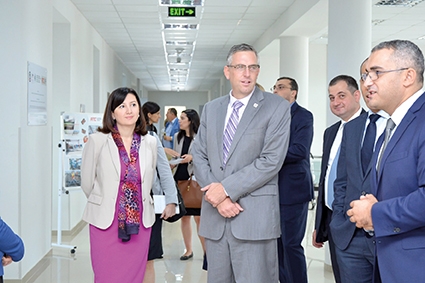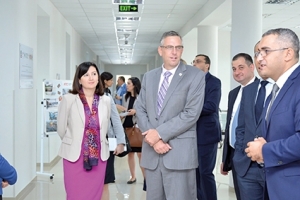COO of the Millennium Challenge Corporation on its Investment in Georgia
Interview
As the Chief Operating Officer of the U.S. Government’s Millennium Challenge Corporation (MCC), Jonathan Nash was in Tbilisi to celebrate and welcome the more than 230 freshman students starting their STEM (Science, Engineering, Technology, and Math) degree programs at San Diego State University in Georgia. He also took the opportunity to visit other projects supported by MCC’s five-year, $140 million grant program while here. We caught up with him during his latest visit.
What is MCC and why is it investing in Georgia?
MCC is an independent US foreign aid agency that is helping lead the fight against global poverty, working to deliver smart US foreign assistance by focusing on good policies, country ownership, and results. MCC provides time-limited grants promoting economic growth, reducing poverty, and strengthening institutions.
As part of MCC’s investment in Georgia, we are engaging with partners from the public and private sectors to increase the earning potential of Georgians. This investment is improving STEM education, with a focus on increasing women’s participation in STEM professions, while also expanding opportunities for vocational training and improving the quality of general education.
What are the MCC projects in Georgia and what are the results to date?
The five-year, $140 million MCC Georgia Compact consists of three projects focused on education and building skills to support employment. The Improving General Education Quality Project is working to rehabilitate deteriorating schools, train teachers and school directors, introduce school system-wide operations and maintenance planning, and provide support for education assessments. Rehabilitation is complete at nearly 60 schools, and construction is underway at more than 30 others and will be completed by the time the compact ends next summer. Teacher and school director training is also fully on track, with more than 17,000 educators and principals having participated in training to help strengthen their skills and introduce student-centered learning.
The Industry-Led Skills and Workforce Development Project aims to increase the number of Georgians with in-demand technical skills that boost employability. Approximately 1,200 students are enrolled in new, industry-demanded professional training programs. By next year, these programs will yield over 1,300 highly-skilled graduates who will fill jobs in transport, oil and gas, agriculture, tourism and other growth sectors of the Georgian economy. This effort has received more than $5.7 million in co-investment from the private sector.
The STEM Higher Education Project is modernizing STEM education through a partnership with San Diego State University (SDSU) that offers high-quality, US-accredited STEM bachelor’s degrees through three Georgian public partner universities. SDSU in Georgia opened its doors in 2014 and has seen enrollment grow each year, welcoming its biggest class of 230 students this academic year, bringing the total number of students pursuing STEM degrees to more than 550.
Why is MCC’s investment in Georgia important?
MCC does not have a “one-size-fits all” approach to work with country partners: for example, our work in Georgia looks very different to our work in Zambia. This is because we use data and analyses to determine the constraints holding back economic growth in a particular country, and then design projects and focus investments to overcome these barriers. In Georgia, as we developed the compact, poverty rates were high, driven by high unemployment, which in part was due to a mismatch between what businesses needed and the skills workers had. This is where the focus on education and training came from.
Improving the quality of education, especially in high-demand fields like STEM, puts young people on a path to prosperity, and having the skills or vocational training to meet the needs of local employers creates career opportunities. Research shows a positive relationship between educational attainment and individual income, and that a highly skilled workforce can be an engine for economic growth. With a strong workforce, and systems in place to continuing developing this workforce, Georgians are well positioned to build on MCC’s investment and change the future of the country.
What role do partnerships play in the compact?
Partnerships with the public and private sector have been instrumental in the success of the MCC Georgia Compact. The partnership between the Government of Georgia and San Diego State University is an excellent example of what can be accomplished when objectives are aligned between two entities. SDSU in Georgia is the only American university delivering STEM bachelor’s degrees in this country, and it is the only program offering young men and women the chance to earn internationally accredited degrees in STEM fields here in Georgia. This opens the door to higher quality and higher paying careers as they enter the workforce.
Partnerships with the private sector have also been essential to the success of this program. The American Chamber of Commerce in Georgia, for example, has been an important partner and an active participant in our SDSU-Georgia Industry Advisory Board. Private sector partners representing some of the largest Georgian companies in energy, water, banking, IT, hospitality, and pharmaceuticals have also contributed more than $3.3 million in scholarships to SDSU-Georgia students. These companies recognize the need for a skilled workforce to grow their business, and many are already working with SDSU-Georgia students to put their STEM degrees to work.
The engagement and leadership of all these public and private sector partners is critical to ensuring the success and sustainability of what has been achieved thus far.
Why is there a focus on women in STEM?
For MCC, empowering women’s economic opportunity is fundamental to achieving our mission to reduce poverty through economic growth. It leads to healthier economies, increases in household incomes, and higher profits for businesses. Women have historically faced barriers to education and careers in STEM. A United Nations study of 14 different countries found that only 14% of female undergraduate students went on to graduate in a science-related field. Through MCC’s programs like this one in Georgia, we are working to break down these barriers. This is one reason I was happy to see that nearly 40% of the new student cohort studying STEM at SDSU in Georgia are young women.
Many of these women are paying it forward as well. Recently, in partnership with the US Department of State, Girl Up, Intel, Google and Microsoft, MCC supported a Women in Science, or WiSci, camp here in Tbilisi that brought together 100 high school girls from Georgia, Azerbaijan, Armenia and the United States. Over the course of two weeks, the girls had the opportunity to take STEM-related classes to develop apps, build robots, and fly drones. It was inspiring to see how the girls left the camp energized and determined to pursue an education in STEM fields. A group of seven young women from the STEM SDSU-Georgia program worked as counselors for this camp and helped to mentor campers.
What comes next?
Our current focus is on successful completion of the compact, which will come to an end in July 2019. We are also committed to the sustainability of these projects and we will continue to work with our counterparts in the government and with our public and private sector partners to ensure this work is carried forward. We are proud of the work that we’ve accomplished alongside the Government of Georgia and are excited to see the future for many young Georgians flourish.
By Maiko Chitashvili












